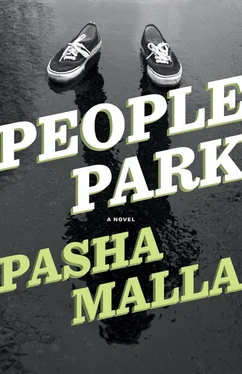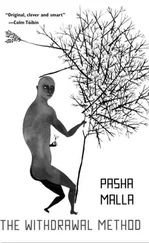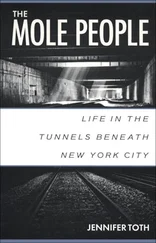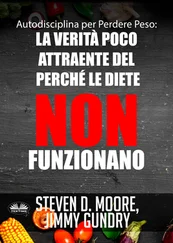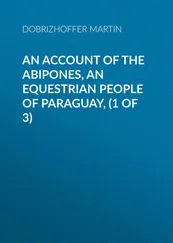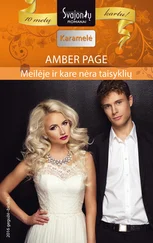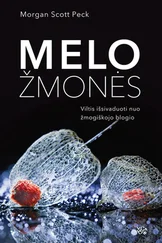For divergent reasons (politics, indignation), Debbie and Adine decided to crash the opening. From the sidewalk outside Loopy’s they watched the city’s sophisticates congratulate each other for being there. Photorealist paintings wallpapered the room from floor to ceiling, art appreciation burbled out onto the street alongside a tinkle of inoffensive jazz.
Debbie hid behind Adine. What if we get kicked out? For sure Lanyess’s in there. We weren’t invited. I don’t want to —
Can you relax? said Adine, and by the elbow steered her inside.
Fifteen minutes later Debbie was following an irate Adine up to the rooftop patio of a pub above Cathedral Circus. A jug of cider arrived, they drank in silence, Debbie eyed Adine warily across the table while traffic wheeled through the roundabout below. Down in the park the poplars swished in the breeze, with the late-summer twilight just starting to settle over the city.
Debbie said gently, It’s nice here.
Except for all the people, said Adine. See, here’s the thing: people suck.
Aw, come on. They don’t.
And by people, I mean people in this city especially. They think the world ends at Guardian Bridge, and all a superdoosh like Loopy needs to do is hold a mirror up to their stupid insular world and they’ll love her for it.
Debbie listened. As far as she knew, Adine had never been off the island.
Was that art ? No, art challenges people, but people don’t want that. They just want to be reassured, to see themselves, to see each other, to feel comfortable in the world. What kind of art only makes you comfortable? Paintings of We-TV? What the fug is that?
Well, said Debbie.
But Adine was on a roll: As if that whole culture isn’t inward-looking enough. You’d think if you were going to paint people from TV you’d, I don’t know, have something to say. But no, she just replicates what’s already there. And people love it!
Wait, inward-looking? Don’t you think that if people were a little more inward-looking then maybe —
You’re not hearing me: people suck.
But, Debbie said, wait. . Isn’t there merit in showing people that there are other people like them? Being a person’s lonely, what’s wrong with art that makes us feel less alone? To create a space where people can connect, with a common language —
No way. Adine tipped back her glass, swallowed. Whose common language?
Don’t get me wrong, I didn’t love the show either, but don’t you think it was at least an attempt to show some diversity —
Diversity! That word’s a fuggin joke. If it was diverse then you’d have a diverse crowd. But everyone there, all those rich dooshmasters — what they were doing? Shopping. Patrons of the arts ? Yeah right. They’re fuggin customers .
Debbie resisted defining the word patrons , instead reached across the table for Adine’s hands. She scowled, but offered one, which Debbie stroked. Maybe it’s your job then to make stuff that shows people something they haven’t seen or thought, that’s apart from their lives? That challenges what they think they know?
Right, I should be working. That’s what you think. You think I’m lazy.
No! I didn’t say that.
Fug that, said Adine. Fug that, fug you, fug everything and everyone.
Something hitched in Debbie’s throat.
Adine filled Debbie’s glass. You know what I mean. Come on, let’s get drunk.
Two hours later, with Adine asleep on her shoulder Yellowlining home, what had begun as a slight yelp of hurt burrowed down into Debbie’s guts and gnawed away down there, persistent and parasitic. She was sad — not at being attacked, that had passed, but at the chasm she felt opening between them.
Until that night, whenever Adine told her of any conflict — with neighbours, motorists, gallerists — Debbie had sided with her wholly: the world was wrong, Adine was right, and the unwavering allegiance helped stitch them together. But Debbie had enjoyed Us: , it’d been nice, inclusive, heartwarming. Of course she kept this to herself, and so at home in bed, feeling disloyal and duplicitous, Debbie did the only thing she could: took Adine in her arms and held her, as close and long and hard as she could.

THERE HE GOES, said Starx, turning on the car stereo — too far, too hard, the grind of distorted guitar filled the Citywagon.
Olpert watched Raven disappear into the We-TV building with Wagstaffe and a pair of pages while Starx banged away on air drums. This music wasn’t music, it was noise, Olpert looked at the radio, thought about turning it down.
We’ve got an hour to kill, screamed Starx. What do you want to do?
Do?
We can’t just sit here, can we? Let’s just drive around. Find some trouble.
But.
Your turn to drive though.
Drive? I don’t really —
But Starx, weirdly quick, had already circled the car, opened Olpert’s door, and now waited there massively on the sidewalk while a sax solo wailed from the speakers.
Though there wasn’t much traffic due to the holiday, navigating downtown’s one-ways, plus his hangover, plus his natural anxiety behind the wheel, plus Starx’s music, plus Starx with his seat slid into the backseat, thumping the dashboard, howling, Drag you down, drag you down, drag you mutherfuggin down, caused Olpert’s grip on the steering wheel to tighten into white-knuckled panic. As he turned onto Paper Street, the song climaxed in a commotion of cymbal crashes and throaty howling.
Olpert cracked his window.
What are you doing.
It’s, Olpert yelled, it’s just a little loud. The music, I mean.
It’s freezing out.
I don’t drive very often. I’m, Starx — I’m finding it hard to concentrate.
Not a Cysterz fan, I guess. Starx snapped the radio off. Better, princess?
Olpert pulled to a stop at Lakeside Drive. He turned, hand over hand, toward Bay Junction and the southern edge of People Park, while Starx played with the powerlocks: chunk, chunk. Chunk, chunk.
A barricade blocked the roundabout’s exit to Parkside West, two Helpers sat in lawnchairs arm wrestling atop a cooler. Olpert leaned out, displayed his khaki, was waved through onto the empty street.
Where are you going? said Starx.
You said just drive around!
By the park? What if the HG’s see us, figure we’re shirking duties? Think, Bailie!
Down the slope Crocker Pond shimmered in the sunlight. Spectators, already numbering in the hundreds, filled the common.
Hey, said Starx, I need to express myself. Pull over.
What?
Urinate.
Here?
Yeah here, I’ll go in the trees. Nothing quite like urinating in the open air.
Can’t you wait?
Bailie, what the fug, mine’s not your average flow. Starx clawed across the frontseat, grabbed the wheel, and yanked the Citywagon over two lanes toward the curb.
A thump — something smacked the windshield, something white and sudden from above. Instead of braking Olpert stomped the gas, the car shot under the Yellowline tracks, veered into the Citywagon lot, and with a succession of explosive highfives, tore the sideview mirrors from a row of vehicles parked along the median.
Bailie, whoa, what are you doing?
We hit a bird, moaned Olpert, we killed a bird.
Brake! Fuggin Bailie, brake!
I’m braking, I’m braking.
The car slowed, Olpert signalled, checked his blindspot, pulled over, stopped.
We hit a bird, said Olpert.
Yeah, I saw that. Quite a performance, Bailie.
The bird, he said, do you think it’s dead?
Starx got out of the car. Olpert trembled, tried to steady his breathing. The walkie-talkie crackled and Griggs, in a typically listless monotone, droned, Silentium. Logica. Securitatem — and before Prudentia Olpert clicked the thing off. In the rearview he watched Starx survey the debris, shake his head, move south.
Читать дальше
